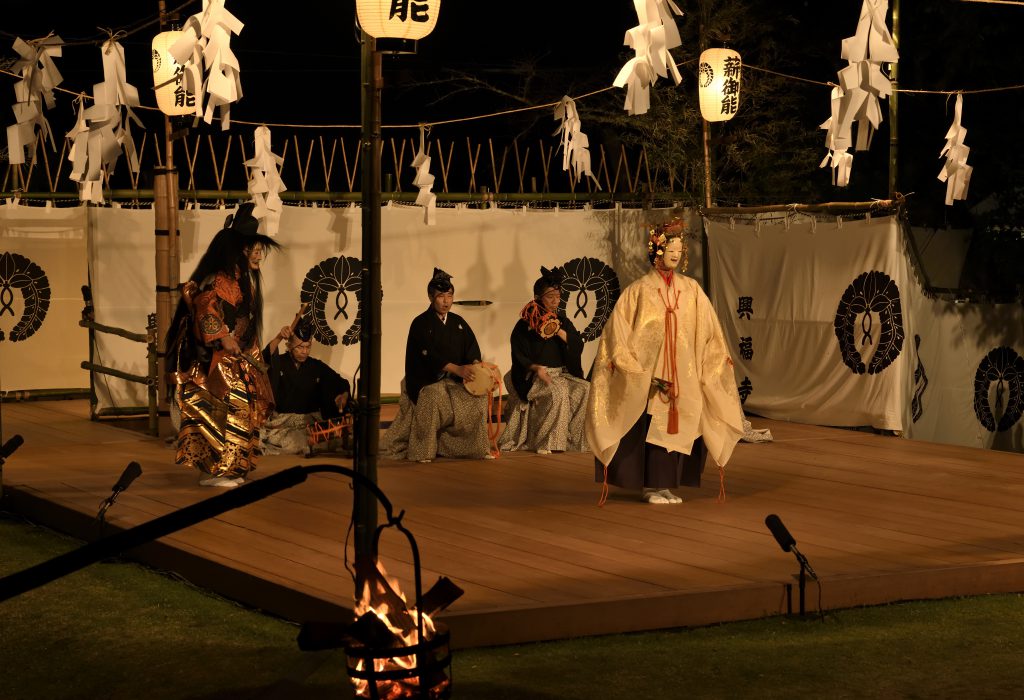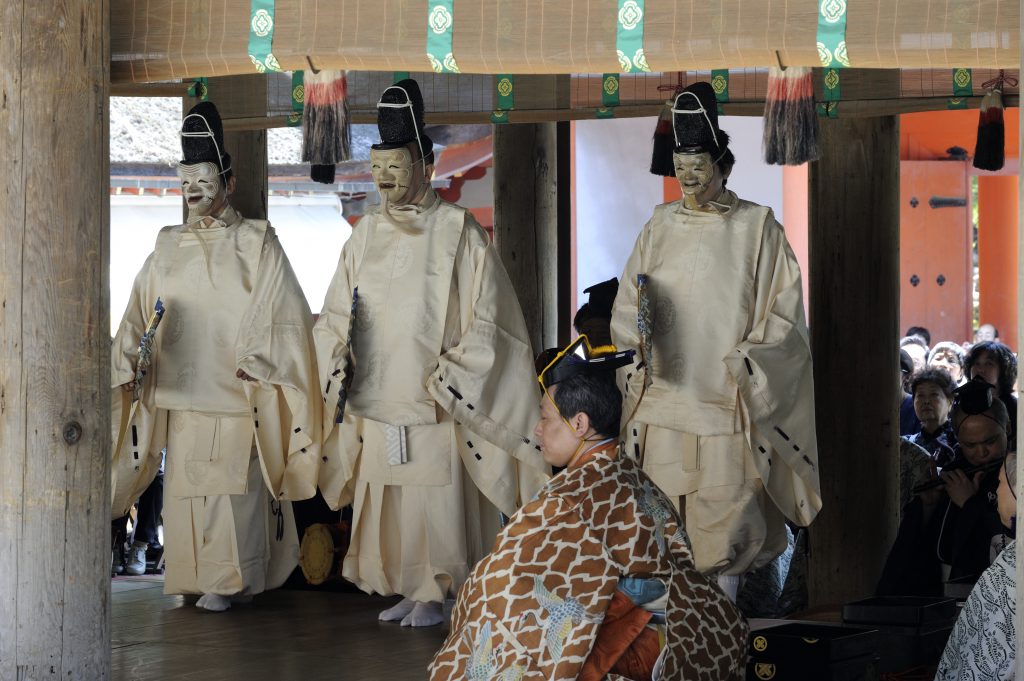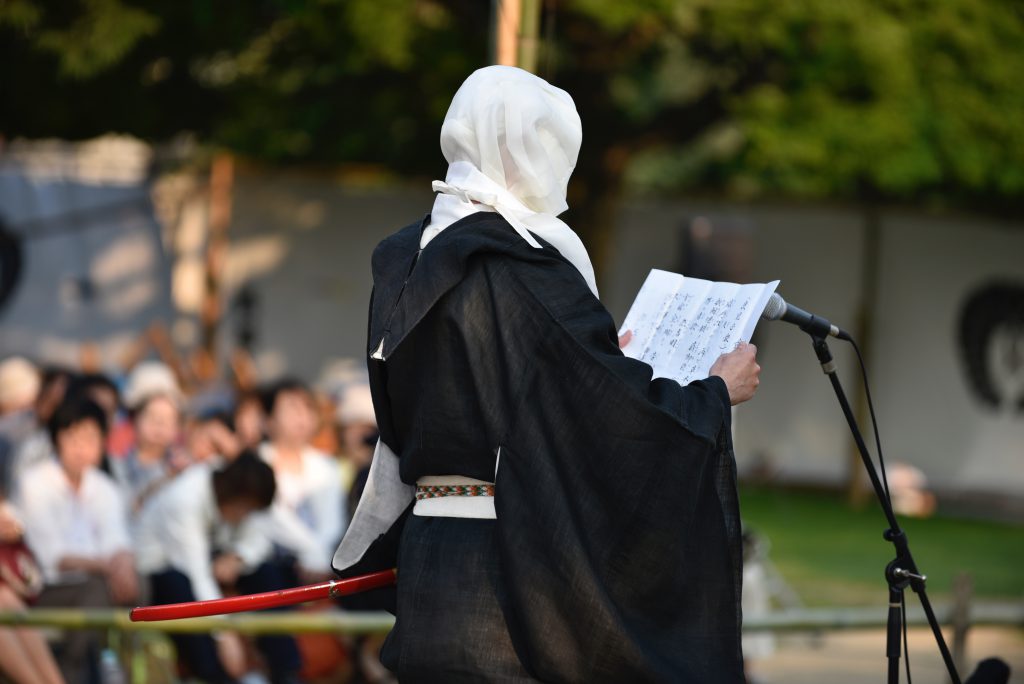2024/3/19
Embodying history and tradition, and one of Nara’s most traditional events, Takigi O-Noh performances are held annually at the World Heritage Kasuga Taisha , and at Kohfukuji Temple’s Nandaimon Gate Han’nya-no-Shiba site in Nara on the third Friday and Saturday in May.

(興福寺「南大門の儀」の様子、写真:桑原英文/Kohfukuji ‘Nandaimon-no-Gi’ Ceremony. Photo by Eibun Kuwabara)
Outdoor Noh performances, held in various places around the country, are thought to have their origins in Takigi O-Noh, one of the traditional events Nara is rightly proud of.
The oldest recorded performance of Takigi Sarugaku was held during the Shunie ceremony at Kohfukuji Temple’s Saikondō (Western Golden Hall) in Jōgan 11 (869) in the Heian Period. The form we see today has been through many changes since then.
In Heisei 2 (1990), the performing art was designated a Nara City Intangible Folk Cultural Property. The event is a highly significant one as it is regarded as representing the beginnings of Noh in Japan.
Originally performed by the Yamato Sarugaku -shiza during ceremonies at Kasuga Taisha, Kohfukuji Temple, and elsewhere, Takigi O-Noh today is performed on two days at Kasuga Taisha and Kohfukuji Temple by the Nohgaku-shiza (four schools of Noh) – Kanze, Konparu, Hōshō, and Kongō, along with Kyōgen performed by the ōkura School.
On both days, a daytime performance is held at Kasuga Taisha and an evening performance at Kohfukuji Temple. The evening events are performed by firelight when a profound air of mystery is created with the actors’ voices resonating around the otherwise quiet space.

(春日大社「咒師走の儀」、写真:桑原英文/Kasuga Taisha Shushi-hashiri-no-Gi Ceremony. Photo by Eibun Kuwabara)
| Day – 1 May 17, 2024 |
‘Shushi-hashiri-no-Gi’ Ceremony at Kasuga Taisha Buden From 11:00 a.m. Find the location on google map |
|
| ‘Nandaimon-no-Gi’ Ceremony at Kohfukuji Temple From 5:30 p.m. Find the location on google map |
||
| Day – 2 May 18, 2024 |
‘Miyashiro-agari-no-Gi’ Ceremony at Kasuga Taisha Wakamiya Shrine From 11:00 a.m. Find the location on google map |
|
| ‘Nandaimon-no-Gi’ Ceremony at Kohfukuji Temple From 5:30 p.m. Find the location on google map |
||
Kohfukuji’s evening ‘Nandaimon-no-Gi’, is held on the west side of the iconic pagoda, and south of the beautiful Chukondō (Middle Golden Hall), on the site of the Han’nya-no-Shiba site of the Nandaimon Gate remains. The program is wonderful, and the ceremonies which precede the performances quite unique. Before O-Noh and Kyōgen are performed, monks known as Kohfukuji Shuto (shuto were mainly responsible for temple administration and security) conduct a ritual known as Butai Aratame or ‘Stage Inspection’.

Butai Aratame has been handed down from a time when Takigi O-Noh performances were held on stages outdoors. Before they started, paper would be laid across the grass to check what the grass was like to walk on, and to decide whether or not performances could go ahead.
Takigi O-Noh today is performed on a shikibutai (Noh Stage), so there is no need to check the condition of the grass, but the Butai Aratame ceremony still takes place before performances in order to carry on the tradition.
A Gen no Sengi proclamation was then sent out, via the Shuto, to people outside the temple, informing of them of the condition of the ground. These traditional rituals and customs are unique to Takigi O-Noh and are not found with other Noh stages.
Viewing these events is a good way to appreciate Nara history.
Both venues have sponsors seats, from which you can comfortably watch the Takigi O-Noh performances. All seats are non-reserved. Sponsored or paid for seat tickets, valid for one day only, must be purchased (tickets are available on the day).
As long as it is on the same day, these seat tickets can, for example, be used for the Kasuga Taisha event in the morning, and the Kohfukuji performance in the evening.
However, a ticket cannot be used on both days. Hence, you cannot go to the Kohfukuji venue on one day (afternoon), and then, for example, go to the Miyashiro-agari-no-Gi at Kasuga Taisha the next morning. Please bear this in mind when buying your tickets.
You may not have much time to see the performances.
If you only want to watch for a short time, we suggest going to see the Nandaimon-no-Gi at Kohfukuji in the evening. There are slightly restricted views of the stage, but this the only venue with standing space. Viewing from these spots is free. This is perfect is you just want to drop in.
Sponsors’ seat tickets
For sale on the day 6,500 yen per person (includes an explanatory guidebook※Japanese only)
※ Adults and children prices are the same. Please buy tickets at the entrances to both venues.
※ Receptions will shut once all the tickets are sold.
●Kasuga Taisha Venue … All sponsored (paid) seats.
●Kohfukuji Venue … Has both sponsored seats and ordinary seats (free standing).
※ In some cases the program, and actors, may be changed.
※ Photography and video (including recording on mobile phones) are prohibited.
※ All seats are non-reserved (first come basis).
※ In case of rain, the Nandaimon-no-Gi will be performed at the Nara Centennial Hall (Large Hall). However, there are no ordinary seats or free standing; there are only sponsors’ seats.
※ Notices of venue changes will be on the Facebook page of the Nara City Tourism Association at about 13:00 on the day.